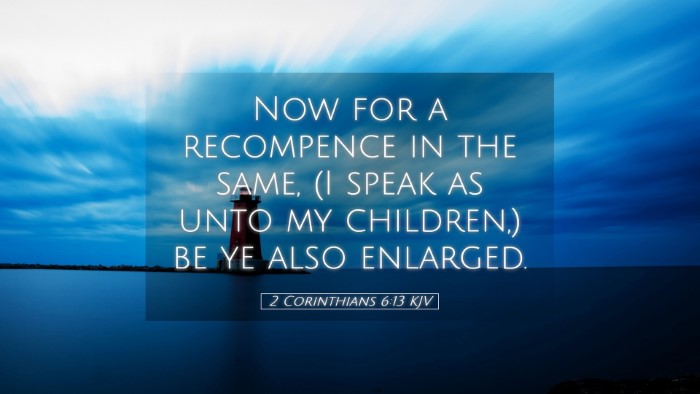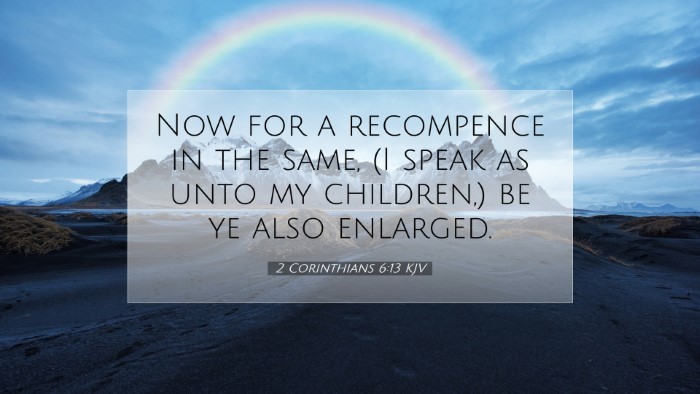Commentary on 2 Corinthians 6:13
Verse: 2 Corinthians 6:13 - "Now for a recompense in the same, (I speak as unto my children,) be ye also enlarged."
Contextual Overview
The Apostle Paul, in his second letter to the Corinthians, addresses several themes essential to Christian doctrine and practice. This particular verse comes at a critical juncture in his epistle, where he shifts focus towards the relational dynamics between himself as a spiritual father and the Corinthian church as his spiritual children. It encapsulates his longing for a deeper, more profound connection with the believers in Corinth, signaling an emotional appeal rooted in spiritual authority.
Thematic Insights
-
Parental Exhortation: Paul uses the term "my children" to evoke a sense of familial relationship, emphasizing not merely authority but also love and care. Matthew Henry elaborates on this, noting that Paul feels a deep responsibility for their spiritual well-being and development.
-
Encouragement to Expand: The phrase "be ye also enlarged" indicates Paul’s desire for the Corinthians to broaden their hearts and minds in their relationship with God and with himself. Adam Clarke emphasizes the notion that spiritual growth requires open hearts that embrace the expansive love of God.
-
Reciprocal Relationships: Paul hints at a two-way relationship; just as he has opened his heart to them, he desires them to reciprocate. Albert Barnes reflects that this reciprocal relationship is critical in fostering a healthy church community, where both leader and congregation contribute to spiritual growth.
Theological Implications
-
Spiritual Expansion: The term "enlargement" speaks to a necessary response to divine love and grace. Theological discussions often highlight that the Christian life is not static but dynamic, marked by continuous growth and stretching. Paul’s call here is not just for emotional or spiritual openness, but a comprehensive lifestyle change.
-
Faith and Community: The context of 2 Corinthians is pivotal, as it addresses the challenges of community tensions and the need for unity in the body of Christ. Paul’s plea is grounded in the belief that a spiritually enriched community can withstand trials and conflicts, and that such enrichment is rooted in mutual love and understanding.
-
Divine Love's Invitation: Through this exhortation, Paul echoes a broader biblical motif of divine love that invites an enlargement of scope—not only in understanding but in action. While God’s love is vast and all-encompassing, it necessitates a response that can shift the dynamics of relationships within the church and beyond.
Practical Applications
-
Embrace Vulnerability: Leaders and congregations alike are encouraged to be open and vulnerable with one another. Just as Paul exemplifies this, pastors and church leaders should model transparency to cultivate trust and authenticity within their communities.
-
Cultivate Spiritual Growth: This verse challenges believers to think about their own spiritual growth actively. It asks the church to pursue broader perspectives and deeper experiences of faith which lead to practical expressions of love towards each other.
-
Foster Healthy Relationships: The reciprocal nature of Paul's message underscores the importance of relationships that nurture growth. Believers are called to engage meaningfully, building environments of encouragement and love where everyone feels valued and included.
Conclusion
In this singular verse, 2 Corinthians 6:13, the Apostle Paul encapsulates the core of his pastoral heart—the desire for greater intimacy, openness, and mutual growth within the body of Christ. His encouragement for the Corinthians to be "enlarged" speaks not only to personal spiritual growth but also to the communal aspect of faith that binds believers together as one body. The insights drawn from public domain commentaries provide rich layers of interpretation and application, inviting believers into a deeper journey of faith characterized by openness, trust, and an ever-expanding experience of divine love.


